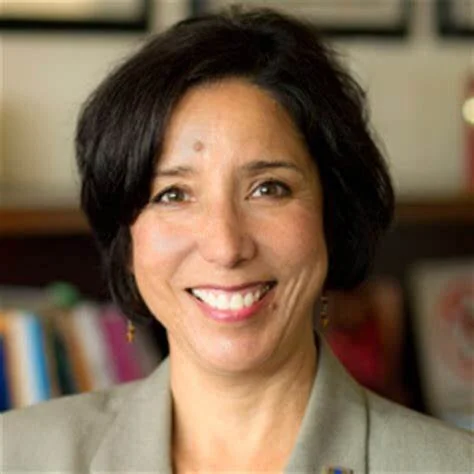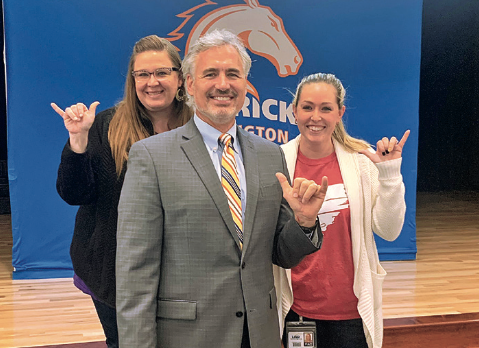The Success of UTA is Built on Thrust and Trust
Since the start of the pandemic, many universities and colleges have had to adapt to societal changes. One university who has gone above and beyond their calling, is the University of Texas at Arlington. The success of UTA has been quite noticeable thanks in part to Maria Martinez and her work as the Associate Vice Provost for Public Affairs.
“To set the stage, UTA has been doing online teaching for 20 plus years, our nursing program, our college of business programs,” Martinez said.
Two things Martinez has done to make the university stand is: adapt her faculty through the engagement of on- line teaching and connect to their student needs. It is her belief that since the pandemic her faculty is “much more amenable on using some of the tools they’ve learned online and how to engage our students.”
The success of her faculty has translated into the understanding and adaptation to their students.
“I think for our students, some of them really love flexibility of their hybrid courses and their online courses, other students discovered that they really want the face to face interaction,” Martinez said “I don’t think we’re going back to fully face to face courses, I think we will continue to have a mix that the faculty and departments will get to decide what’s a good mix for their students.”
Like any other university, UTA has experience their share of difficulties during the pandemic. One of the current problems that exist is the technology gap between students and the ability to connect to their courses.
“Our first-generation students which are largely Latino, many of them are struggling with a digital device,” she said. “Many of our students use their computer labs on campus, they don’t have computers at home, or they may not have internet.”
While the struggle may be hard for their students, Martinez and her faculty continue to work in diverse ways to adapt to the needs of their students. “We shipped computers to students, we shipped hotspots to students and there’s also so much there as a public institution we can do,” she said.
Another way the university is adapting to student needs, is through their connection to their professors and instructors. Her motto is: if a student can connect personally with a professor, then they are more like to branch out and get that extra support they need.
“We’re exploring ways that can connect with our peers and help each other,” Martinez said.
Students continue to be the number one priority for the university as Martinez holds onto the idea that no child gets left behind.
“Our goal is access through excellence, we want to make sure we are an affordable place for students to come and get an outstanding education.”
Dr. Troy Johnson brings history to UTA
With this pandemic in full swing, the University of Texas at Arlington hopes to continue to reach students of all background. This past school year, the university broke a record not many universities can say they have achieved.
“We have a freshman class approaching 4,00 students and 37 percent of that class is Hispanic which represents a little over 1400 brand new freshman,” Dr.Troy Johnson said. “This percentage of Hispanic students is very uncommon at American Research Universities and even at Texans Research Universities.”
The goals of the university go hand in hand with the students’ needs and wants. Currently, UTA has a high track record of retaining students for the following school year and connecting them to the best possible resources.
“UTA has a lot of aspirational goals and leads to why Latinos choose to come here, we want to progress and get better, they see that, they feel that,” Dr. Johnson said. His motto is that the university must look beyond the school year and towards the future for students.
One way the university has done this, is by creating a partnership with the Hispanic Chamber of Commerce. The goal of the partnership is simple: “to develop this internship network that would provide placements into the workforce for these Hispanic Chamber of Commerce companies.”
“We’re really proud that we’re part of that and we’re ready for COVID-19 to straighten out a little bit, so we can get that going,” he said. The university hopes that the alliance between the two will set as a stepping stone for other universities to follow in their footsteps.
“Our chamber of our vision in this one is that it would scale to other universities and their Latino students and how they would be able to benefit,” Dr. Johnson said.
With the university breaking records, Dr. Johnson and his team understand that they are setbacks that may occur. Currently, the school is seeing “Many first-generation, low income students especially, behind in applying for admission.”
The university believes that with the pandemic, many students are having a hard time applying to schools.
“This is a moment in time that anyone that believes in a college degree, whether that’s me, your friends, your coworkers, it is very important to realize the risk our nation is in right now with the possibilities of our families and students going to be easily deterred from pursuing in college,” Dr. Johnson said.
While struggles may exist in the future, the school believes that the only way that they may be overcome, is through unity and understanding. Dr. Johnson expresses the importance of unity by stating that, “We all learn by being together and it’s a better experience, the future will demand that, the future will demand that people will assemble.”
His belief is that the university must continue to strive in the best way possible for their students.
“We need to be sure we talk to people that you need to stick with it, you’ve got to go to college, you’ve got to apply for financial aid, there’s resource there to help you.”
UTA continues to build upon their faculty
The collaboration between students and teachers has been one of the top qualities that makes UTA stand out compared to the rest of the college spectrum.
“The reaction has been very strong among our faculty to learn the tools and to learn the best ways to reach their students in this environment,” Associate Vice Provost for Faculty Affairs, Ann Cavallo said.
Cavallo has been an essential piece in training her employees and colleagues to best adapt to the new educational world. One thing that the department has done is provide the staff with numerous training and ad- aptation skills to best match the role of their students.
“I have seen so much interest in improving their teaching,” Cavallo said. “I have seen faculty really step up during this pandemic and when Dr. Troy Johnson they were told to switch online, we had thousands of trainings, thousands of faculties come to us.”
One thing that the trainings have included is the ability for faculty to connect with students on a personal level. The school uses a teaching strategy called “responsive pedagogy.” This sort of training allows staff to incorporate diverse ways that can match students best interest and needs.
“Many of our programs include cultural responsive pedagogy, where we’re trying to teach faculty to incorporate some different strategies to include students that are underrepresented groups in not only STEM but all fields,” she said.
Another way that the university has reached students is through the commitment of unity. Each department and faculty member have placed the needs of students on the top of their list as they continue to adapt to them the best way that they can. “We all know if a student is struggling and we are all together, one team,” Cavallo expresses.
“The Division of Student Success, Student Affairs, The Faculty Affairs, Cohost and offices, we all work together because it’s about the students, we all want to help the stu- dents be successful,” she says.
Besides the training of their faculty and staff, the university has also reached students through a variety of tutoring programs. “We have the IDEA center,” she explains.
The center is “available for all students for tutoring and it’s where students find others like themselves who they can count on to help them through their course work.”
Cavallo believes it’s important to have that peer you can connect with and someone who can help you grow as a student.
The university continues to work in several ways to keeps students engaged and foster their education within the university.
“They have shown so much dedication and care to wanting to improve the success of their students and wanting to be there for them,” Cavallo said.
Cavallo’s initiative speaks volumes of the hard work she does for the university and the impact it has on students does not go unnoticed.
“In terms of engagement, they’ve been very involved in the trainings we’ve offered, the number of engagements has been high, and they’ve been very involved in improving.”



